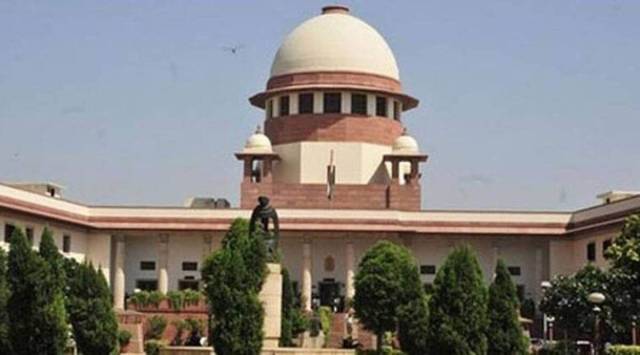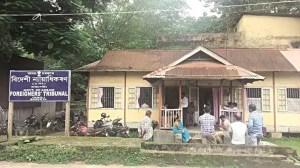Impoverished shrines, opposition from priests, Karnataka move to free temples from state control to face many impediments
The Congress and the association of priests are opposing the move as most of the temples are not rich enough to fend for themselves and amid fears of private managements usurping the properties of big temples.
 Allowing the Centre’s request for time, the bench added in the order that “...he (SG) requests for four weeks’ time to place the stand on record on these matters” and fixed May 10 to hear it next.(File)
Allowing the Centre’s request for time, the bench added in the order that “...he (SG) requests for four weeks’ time to place the stand on record on these matters” and fixed May 10 to hear it next.(File)A proposal by the Bharatiya Janata Party (BJP) government in the Karnataka budget earlier this month to free temples from government control is set to face impediments as most of the temples lack the resources to function without state support and priests fear that temple properties would be used for private profit if it is realised.
According to government data, 34,219 of the 34,563 temples under the Muzrai department in the state earn less than Rs 5 lakh per annum. Meanwhile, 139 temples earn between Rs 5 lakh and Rs 25 lakh per annum and 205 temples earn 25 lakh or more per annum.
In his budget speech on March 4, Karnataka Chief Minister Basavaraj Bommai reiterated a commitment he had earlier at a BJP state executive meeting to free temples from state control as sought by a section within the party. As many as 34,563 temples come under the purview of the Karnataka government at present under three separate categories.
“There is a long pending demand to do away with government control on the temples. By considering these demands of devotees, autonomy will be given to temples coming under the purview of the endowment (Muzrai) department. Necessary legal action will be taken to delegate the discretion of developmental works to the temples,” Bommai said in his budget speech.
Earlier, in December 2021, Bommai had stated at a BJP state executive meeting that the government intends to free temples from bureaucratic control exercised under the Karnataka Hindu Religious Institutions and Charitable Endowments Act of 1997, which came into force in 2003 to replace five region-specific laws for temples in the state.
The proposal by the BJP government to remove government control over temples has been opposed by the opposition Congress party and the association of priests as most of the temples are not rich enough to fend for themselves and amid fears of private managements usurping the properties of big temples.
“The government wants to free up temples from state control. This will result in huge amounts of properties coming under private control. Much of the properties of temples were donated by erstwhile kings. If they create private trusts and hand over all the properties to the trust, who will guarantee the protection of these properties,” said K S N Dixit, the general secretary of the Karnataka Archaka Okkuta, a federation of temple priests and workers.
“The temples in Karnataka have over Rs 10 lakh crore worth of properties. Who will ensure that these properties are not misused? At present, it is under state control and so there is some amount of fear of misuse of temple properties,” said Dixit.
“Many private temples are now being given to the Muzrai department because of mismanagement. The Mahalakshmi Layout Anjaneya temple, the Jayanagar Kasturi temple in Bengaluru are being given to the Muzrai department due to mismanagement,” Dixit said.
Dixit said that the priests would welcome a law for greater autonomy for temples but it should be conditional. “The temple must be under the control of the state government and the priests must come under the government,” he said.
According to the priests federation, the trustees at many privately managed temples have become millionaires by misusing temple assets. “Private managers will ask for properties to be given on lease to whoever they identify,” Dixit said.
The majority of temples in Karnataka are heavily dependent on government grants for their functioning. In the budget, Bommai, in fact, increased the ‘tasdik’ amount or land compensation paid per year to temples from Rs 48,000 to Rs 60,000. “The ‘tasdik’ amount will be increased from Rs 48,000 to Rs 60,000 to help out archakaru, agamikaru (priests), and employees of endowment temples,” Bommai said.
`”The priests were given only Rs 4,000 per month to conduct all temple activities including pujas. This amount is too little. Our federation carried out a campaign and the government has increased the Tasdik amount. In rural areas, there are no priests and poojas are conducted once in two months in many temples,” Dixit said.
One of the primary reasons cited by sections of the BJP for freeing up temples from state control is allegations by right-wing groups that revenues from temples are being diverted for management of facilities of other religions in the state like mosques of Muslims.
Under the Karnataka Hindu Religious Institutions and Charitable Endowments Act, 1997, the funds collected from temples is added to a common pool at the rate of “10 per cent of net income of temples whose gross income exceeds Rs 10 lakh” and five per cent in the case of institutions whose gross income is between Rs five lakh and Rs 10 lakh. The funds are used primarily to maintain the temples and not diverted anywhere, says the Muzrai department.
“The common pool fund is utilized as per the provisions under Section 19 of the Act with the prior approval from a Rajya Dharmika Parishath,” according to the endowments department.
The opposition Congress party in Karnataka has opposed the BJP government’s proposal to free temples from state control and has called it an agenda by a small group in the BJP against the majority of people of Karnataka.
Former Congress chief minister Siddaramaiah has alleged that the BJP is carrying out false propaganda by alleging funds collected by temples are being used for other religious institutions.
“Hindu temples and religious institutions are being provided annuity and Tasdik amounts (compensation for land vested with the government) by the state government. This is being done from government funds. This is compensation from state resources and not revenues of temples,” Siddaramaiah said.
“This is a plot to capture assets of 80 per cent of the Hindu community and vest it with two to three per cent of the community. If the government proceeds with the move, it will be an insult to the struggles of people for over 1,000 years in the state,” Siddaramaiah had said earlier.
The BJP has accused Congress leaders opposing the temple privatisation of following in the footsteps of the Mughal king Aurangzeb and the British in wanting to control temple funds.
In June 2021, the BJP government announced that it had stopped providing Tasdik amounts to non-Hindu religious institutions like mosques due to protests by Hindu groups.
The step was undertaken even though Tasdik amounts to religious institutions were being provided from state grants and not from revenues of temples which is prohibited under the Karnataka Hindu Religious Institutions and Charitable Endowments Act of 1997.
The state government is yet to spell out the modalities of the temple privatisation move – like whether the state will continue to support the nearly 34,000 small temples and free up only the high-income temples or how the reduction in the pool of funds for maintaining smaller temples will be managed if the high-income temples are given autonomy.
According to data on grants given by the state government to 34,563 temples under the control of the endowments department in the last five years – which was furnished in the state Legislative Council in December 2021 by Muzrai Minister Shashikala Jolle – the BJP government has allocated Rs 465 crore of funds for Hindu temples and religious institutions in the 2020-21 period – the highest in the last five years.
According to the data, the Congress government headed by Siddaramaiah which was in power during the 2017-18 period allocated Rs 447 crore, the coalition Congress-JDS government that was in power during 2018-19 allotted Rs 248 crore, and the B S Yediyurappa-led BJP government allotted Rs 294 crore in its first year (2019-20) and upped it to Rs 465 crore in 2020-21.
Incidentally, a rule introduced under the Karnataka Hindu Religious Institutions and Charitable Endowments Act, 1997, during the Congress tenure in 2002 – restricting non- Hindus from doing business in the premises of temples – is being currently cited by the BJP and right-wing groups to restrict Muslims from doing business within temple premises during an ongoing season of temple fairs in parts of the state.
“This boycotting of Muslim traders never happened earlier. It is a new phenomenon. We have always lived like brothers. This is the handiwork of the Bajrang Dal and the Rashtriya Swayamsevak Sangh (RSS) in places like coastal Karnataka. This is great injustice,” said Dixit.







